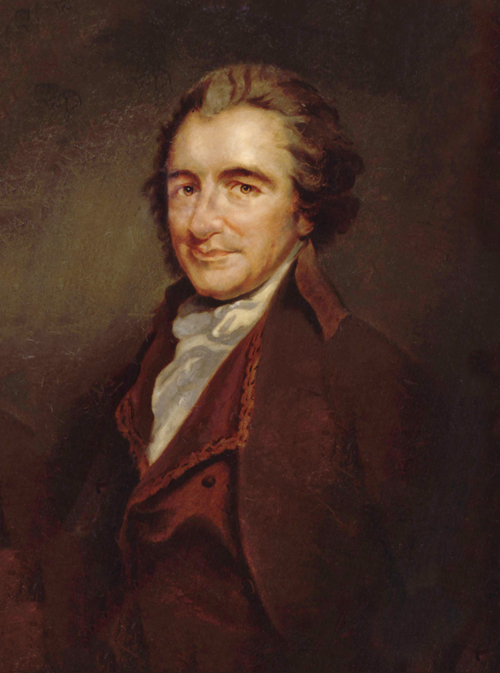
Your complimentary articles
You’ve read one of your four complimentary articles for this month.
You can read four articles free per month. To have complete access to the thousands of philosophy articles on this site, please
Philosophical Haiku
Thomas Paine (1737-1809)
by Terence Green
Just revolution:
Common sense proscribes despots
Nature prescribes rights.

Thomas Paine was exactly the sort of revolution-making rights-loving do-gooder that Edmund Burke found tiresome. But lots of other people liked him. Paine was born to be a revolutionary – which was lucky, because there happened to be two jolly good revolutions during his life-time.
With Benjamin Franklin’s help, the British-born Paine emigrated to the American colonies in 1774 to rouse the rabble to overthrow the yoke of British oppression. Paine’s book Common Sense (1776) explained to the still politically-undeveloped Americans why they were justified in telling King George III to shove off. The book became an all-time American bestseller. Fellow Founding Father and second American President John Adams even said that without Paine there would’ve been no revolution (he might’ve added that there’s no revolution without pain!).
Having sorted out the Americans, Paine headed off to France to take care of the revolution there. In response to Burke’s hostile Reflections on the Revolution in France (1790), he penned The Rights of Man (1791), in which he explained how it is that everyone comes to have lots of rights to lots of things (thereby laying the groundwork for the ‘Me generation’). He claims that human rights come to us from nature – we’re born with them – and if the sovereign isn’t doing a good job in protecting our rights and providing us with what we need, one of those rights says we can get ourselves a new sovereign.
Paine spent most of the 1790s living in France, even being elected to the revolutionary National Convention. Then the usual story: he joined the wrong group of revolutionaries, the revolutionary leader Robespierre took a dislike to him, and he was arrested and imprisoned. He only just managed to keep his head. Robespierre lost his in the meantime, effectively saving Paine’s. Paine (possibly) finished writing The Age of Reason (1794) while in prison.
When not stirring up revolutions, Paine was just your typical humble corset-maker, which it was his right to be.
© Terence Green 2017
Terence is a peripatetic (though not Peripatetic) writer, historian and lecturer. He holds a PhD in the history of political thought from Columbia University, NYC, and lives with his wife and their dog in Wellington, NZ. He blogs at hardlysurprised.blogspot.co.nz.









